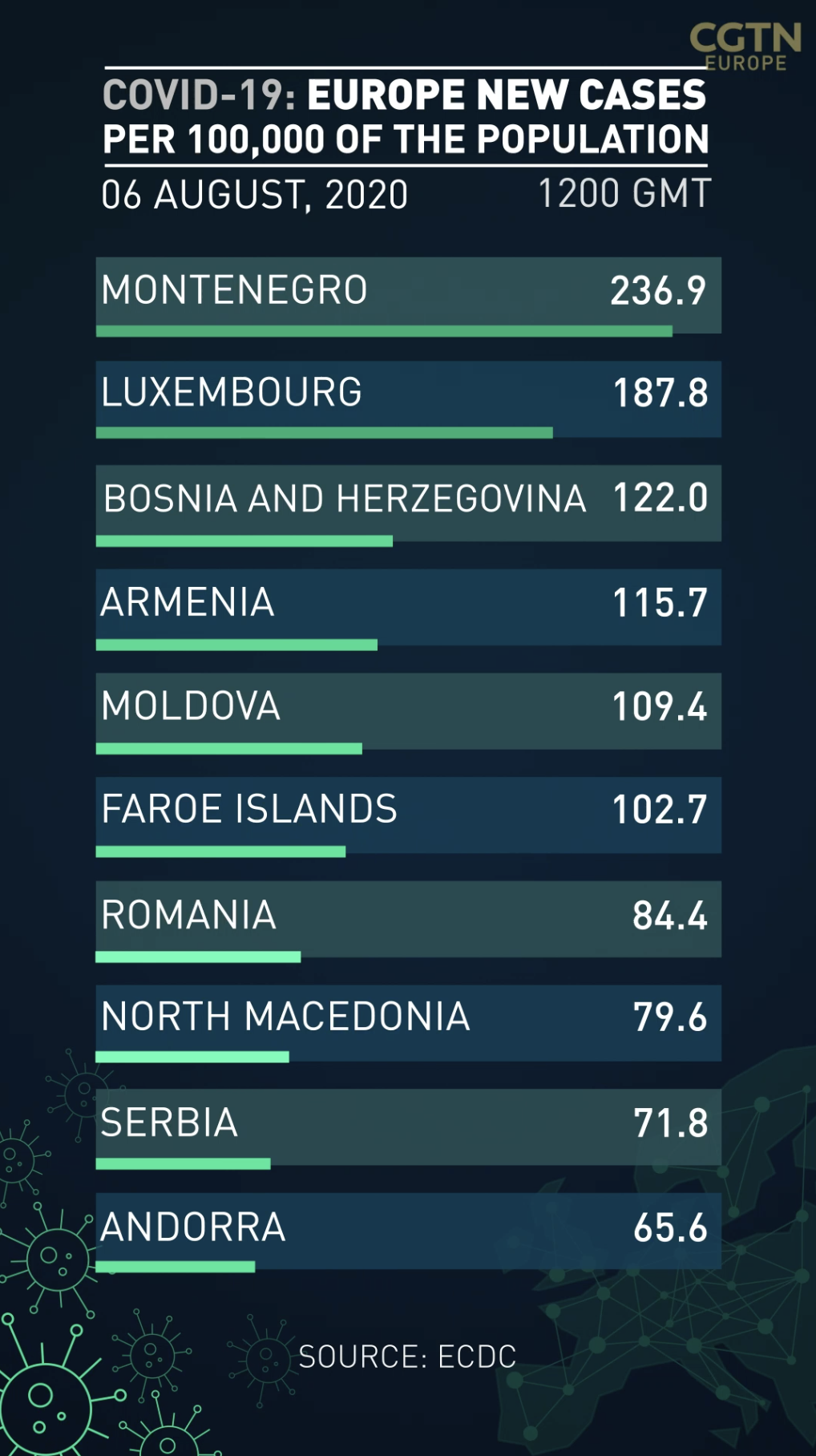TOP HEADLINES
- Italy's national aviation civil authority, ENAC, has threatened to revoke Ryanair's permit after it accused the Irish airline of "repeated violations," of regulations there to protect the health of passengers.
- Germany has warned its citizens to avoid all non-essential travel to the province of Antwerp in Belgium after a rise in infections in the area. Belgian authorities have responded to the increase by opening a testing village.
- Romania's schools will reopen from 14 September, President Klaus Iohannis announced. Towns dealing with local outbreaks are likely to hold classes online instead.
- Belgium's capital, Brussels is thinking about implementing the mandatory wearing of masks in public spaces and private spaces accessible to public if the spike in cases there continues.
- Germany recorded its highest daily new infections for three months. The country registered 1,045 new cases in the past 24 hours.
- Austria has warned its citizens against travel to mainland Spain as infections continue to rise there. The measure, which includes people returning having to provide a negative test result, will take effect from Monday.
- Norway will reimpose a 10-day quarantine for all travelers from France, Switzerland and Czechia.
- Finland has entered a "second stage" of the virus as Belgium, the Netherlands and Andorra were removed from its green travel list.
- Spain reported its most significant rise in infections since the national lockdown was eased in June. Federal data show 1,772 new cases were recorded in the past 24 hours as the spike continues.
- The Dutch cities Amsterdam and Rotterdam have made face masks compulsory in certain areas. "We're starting this experiment because we're worried about the increasing number of coronavirus infections," the Amsterdam City Council said.
- German airline Lufthansa said it does not expect air travel demand to return to the level it was before the pandemic until at least 2024.
- The UK's construction industry continues to grow rapidly following the lockdown. The IHS Market index rose to 58.1 in July, from 55.3 in June. The index fell to a record low of 8.2 in April, when the country was at the peak of the pandemic. A number above 50 represents expansion.

A COVID-19 testing village has opened in Antwerp, Belgium in a bid to try to slow the spread of the virus in the area. /AFP
A COVID-19 testing village has opened in Antwerp, Belgium in a bid to try to slow the spread of the virus in the area. /AFP
Some sort of second stage has begun. Whether we can expect a smaller wave or a larger wave depends on how we respond.
- Liisa-Maria Voipio-Pulkki, Finland's health ministry's strategic director
ACROSS EUROPE
Andrew Wilson in the UK
There are reports that Belgium could be added to the UK quarantine list. By the end of the week, travelers arriving from the country may have to quarantine for 14 days on their return.
New statistics are expected today on the government's test-and-trace program, with ministers concerned about the opening of schools in a month's time.
There are still suggestions that other parts of society may have to be shut down to allow the education sector to come on stream in September.
The NHS has now released a list of 28 pubs in the Scottish city of Aberdeen that have been visited by people who have now tested positive for COVID-19. The city has been in reimposed lockdown since Wednesday.
A new survey shows that only 34 percent of Britons are back in their offices, compared with 75 percent of Germans, Italians and Spanish, and 83 percent of office staff in France.
John Bevir in Frankfurt
For the first time since May, there were more than 1,000 new daily coronavirus cases in Germany – 1,045 confirmed infections were reported and a further seven people died, bringing the total to 9,175.
Local districts of Germany believe they are well prepared to deal with a second wave, which some think has already hit the country.
The managing director of the Association of Cities and Municipalities highlighted that local authorities had readily available PPE and praised the increase of laboratory testing facilities across the country.
Toni Waterman in Brussels
A COVID-19 testing village opens in the Belgian province of Antwerp on Thursday, as the number of new cases continues to increase.
The test site is made up of three lanes, two for cars and one for those on foot. Up to 600 tests can be carried out a day, although the organizers say there's scope to expand if the situation worsens.
Antwerp, which is Belgium's most populous province, has been the epicenter of the latest coronavirus outbreak. Local officials imposed stricter measures, including a late-night curfew, two weeks ago.
It appears to be working. While cases continue to rise, it's at a slower rate. The governor of Antwerp said on Wednesday that some measures will be slightly relaxed, although the curfew will remain in place.
00:20

Stefan de Vries in Amsterdam
Following an increase in infections, Prime Minister Mark Rutte will give an extra press conference on Thursday.
He is expected to announce new testing facilities at Amsterdam's international airport, Schiphol. He may also order universities to cancel their traditional introduction weeks.
Last week, 2,588 people tested positive, double the amount of the previous week. The new outbreaks are concentrated in the densely populated provinces of South and North Holland as well as in Brabant.
On Wednesday, Amsterdam and Rotterdam, the two largest cities, started a test with mandatory face masks in busy areas such as shopping streets and markets.
For the time being there will be no national obligation to wear a face mask, apart from on public transportation.
The Dutch government and the national health authority, RIVM, state that there is not enough scientific proof face masks are really useful to stop the virus’s spread.
France
The number of new cases in the past 24 hours is the highest in two months. On Wednesday, 1,695 new infections were reported.
Nine people died, bringing the total to 30,305 diseases related to COVID-19. The number of young people (20-30 years) infected has risen in the latest group of cases, attributed by authorities to less respect for social distancing measures during the summer holidays.
According to a study by Dares, the national statistics institute, one of the explanations of the spread of the coronavirus in France may be the fact that French workers tend to go to their office even when they’re feeling ill.
France will increase aid for winegrowers to $296 million. The sector has been severely hit by the coronavirus crisis.
01:05

FROM OUR GLOBAL COLLEAGUES
CGTN Europe podcast: Notes on a pandemic: Science rules
CGTN China: Chinese mainland reports 37 new COVID-19 cases
CGTN America: U.S. signs $1bn vaccine deal with Johnson & Johnson
CGTN Africa: Kenya's COVID-19 recovery cases to 10,000
Sign up here to get the COVID-19 Europe bulletin sent directly to your inbox
CGTN Europe has been providing in-depth coverage of the novel coronavirus story as it has unfolded. Here you can read the essential information about the crisis.